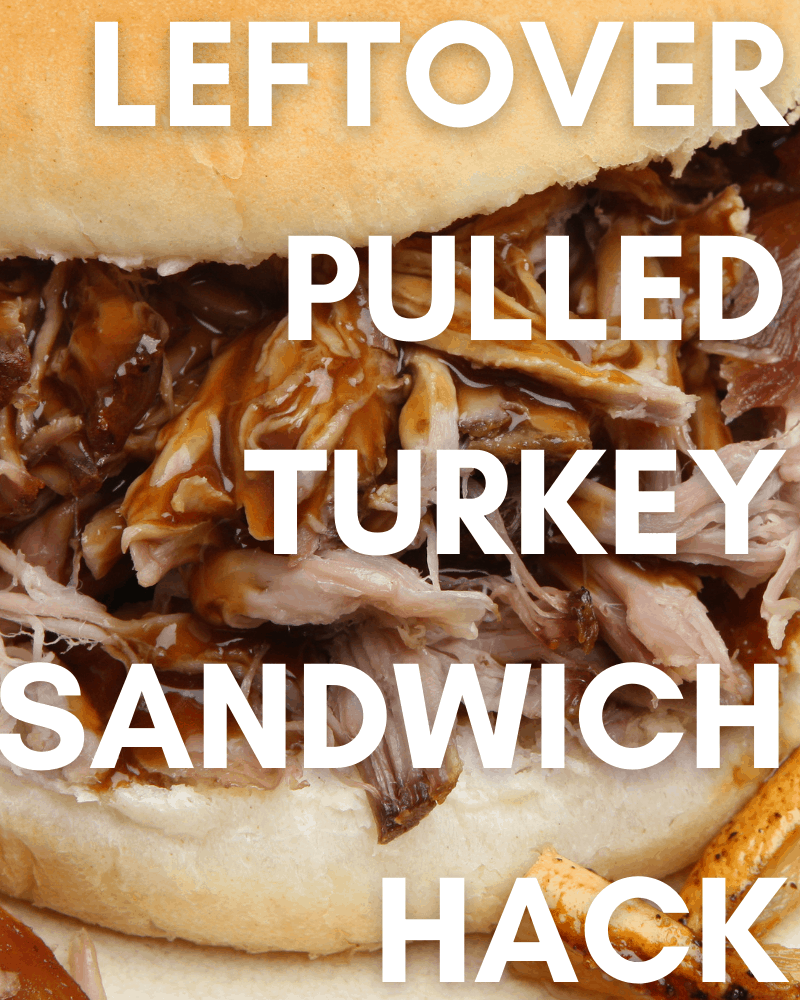When bringing a bag of uncooked potatoes home from the grocery store, you might pause and wonder: What’s the best place to store these earthy gems?
Knowing the right place to keep potatoes fresh for a long time can definitely be confusing. Whether you’re thinking about stashing them on the kitchen counter, tucking them away for long-term storage, or just looking for the great way to preserve their natural goodness, understanding potato storage is key. In this post, we’re going to dig into the different ways to store potatoes and why the Food Standards Agency’s guidelines matter. So, if you’re curious about where and how to store your fresh spuds, read on to unearth the secrets of keeping your potatoes perfect!
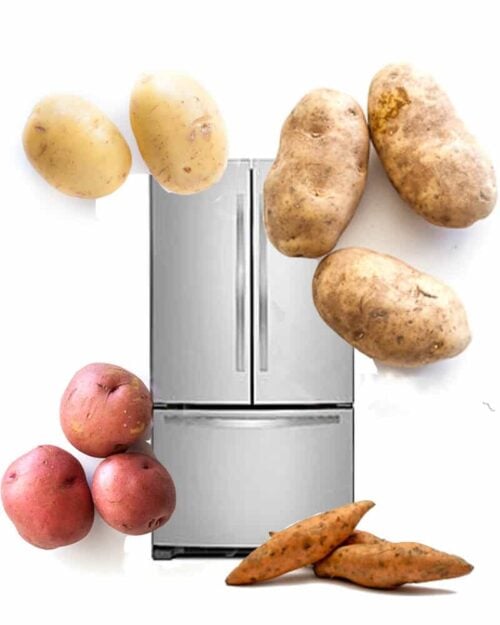
Should I refrigerate potatoes?
We researched extensively and referenced recent studies from University of Idaho Extension and Potato Research Centre, Agriculture and Agri-Food Canada and other resources (links at end of article) to find the best way to extend the shelf life of potatoes. Here’s what we found:
The best way to store raw potatoes is in high humidity, with the ideal temperature being between 42F-55F, in a dark closet, cool garage, or kitchen pantry.
- DO keep potatoes in a plastic bag perforated with lots of little holes (the bag potatoes come in). The bag helps keep humidity levels up, while the holes allow air circulation.
- DO keep potatoes in DARK place. Drape the bag with kitchen towel to block light.
- DO NOT store potatoes where it could get warm, like under the sink, next to a big appliance.
- DO NOT wash potatoes until you are ready to cook them.
What if my home is too warm?
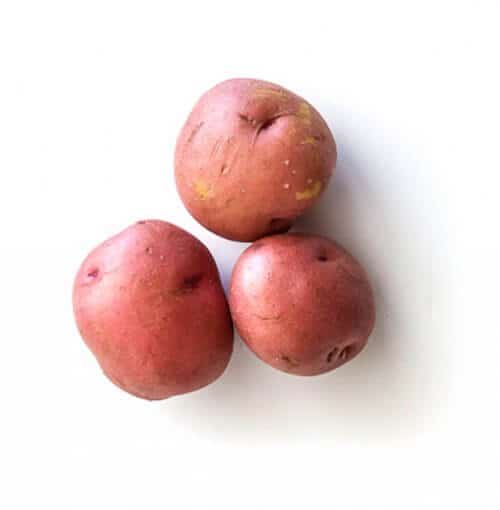
If your home is too warm, you can store potatoes in the refrigerator to prevent sprouting and certain potato disease-causing organisms (that thrive in high temperatures). The good news is that refrigerating potatoes will cause some of the starch to turn into sugar, resulting in a sweeter potato. However, it will also cause them to darken if fried in oil (french fries, potato chips).
- You CAN refrigerate potatoes if your home is too warm, like in the summer months.
- DO NOT refrigerate potatoes if you are planning to fry in oil. If you are boiling, steaming, baking, roasting potatoes, refrigeration is perfectly fine.
- DO keep potatoes in the plastic bag they come in.
Can I store potatoes and onions together?
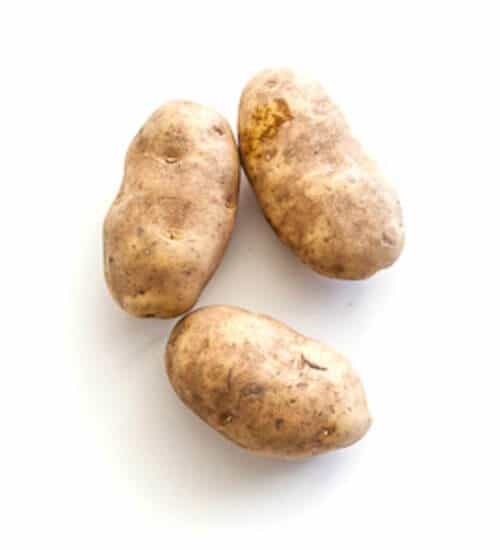 There is a ton of research on the effect of ethylene gas, which many other fruits and veggies release, on potatoes. Unfortunately, some of that research is conflicting.
There is a ton of research on the effect of ethylene gas, which many other fruits and veggies release, on potatoes. Unfortunately, some of that research is conflicting.
The most comprehensive and controlled research found that short exposure of ethylene caused increased sprouting. It is best to keep onions and potatoes separate. In fact, keep all fruit away from potatoes.
DO NOT store potatoes and onions together.
DO NOT store potatoes and fruit together.
How to store sweet potatoes

Sweet potatoes like slightly warmer temperatures, between 55F-60F, at 80% humidity. Keep them unwashed, throw them in a large brown paper bag or a cardboard box, and store in a cool, dark place. Properly cured and stored sweet potatoes can last up to 6 months!
DO NOT refrigerate sweet potatoes – the cold will turn the sweet potato hard in the center.
Is green on potato safe to eat?

Potatoes turn green due to accumulating chlorophyll when exposed to too much light or sunlight. The chemical compound that forms during the greening is called solanine. It tastes bitter, and in large quantities, it can make you really sick. Solanine is toxic – it’s the plant’s natural mechanism for pest control. When growing potatoes are exposed to sunlight, solanine will prevent animals or insects from eating the uncovered tuber.
DO slice off any green spots on your fresh potatoes if they’re limited to small areas on the surface of your potato skins.
DO NOT eat the potato if the green areas cover most of it. It’s best to just discard green potatoes.
Are sprouted potatoes safe to eat?
DO just cut off the sprouted parts and cook if the potato is still firm, but has a couple of sprouts peeking through.
DO NOT eat if the potato is soft and wrinkly with sprouts. Throw it away.
What is the black crusty dirt on the potato?

It’s actually not dirt. Those black spots that seems so hard to scrub out of the little eyes and on the surface is actually a safe fungus.
The potato industry calls it “Black Scurf.” It’s perfectly safe to eat. It’s just not pretty
DO just try to scrub or cut off as much of it as you can.The potato industry calls it “Black Scurf.” It’s perfectly safe to eat. It’s just not pretty.
What is the hole in the middle of the potato?
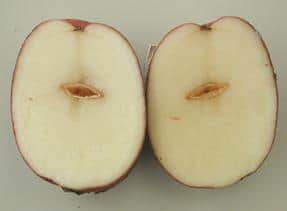
If you’ve ever cut open a potato and found a small hole in the middle, sometimes black or brown, you probably thought the potato rotted, or perhaps a bug ate its way through.
But actually, the hole and discoloration, called “hollow heart,” is caused by environmental stresses, like sudden change in weather, too much rain or nutritional deficiency.
DO just cut the hole or discoloration away. It’s safe to eat.
Identifying Spoiled Potatoes
Knowing when to say goodbye to your potatoes is as important as understanding how to store them. After all, no one wants to end up with food poisoning from eating spoiled root vegetables. Let’s dig into the signs of spoilage, so you can ensure your potatoes are always in prime condition for cooking.
Signs of Spoilage in Potatoes
- Soft Spots and Wrinkles: Proper storage can keep your potatoes firm for a long time. If they start to feel soft or develop wrinkled skins, it’s a sign they’re past their prime.
- Foul Odor: A healthy potato should have an earthy, neutral smell. If you catch a whiff of something foul or musty, it’s a clear indication that your potato is heading to rotten territory.
- Green Tinges: Potatoes sometimes develop a green color when exposed to light for too long. This green part contains solanine, a natural toxin that can cause food poisoning. It’s best to cut away small green areas or discard the potato if a significant portion is green.
- Sprouting: While a few small sprouts can be cut off, extensive sprouting is a sign your potatoes are over the hill. Sprouts can be toxic, especially if accompanied by a green tinge.
- Mold Growth: If there’s visible mold on the surface, it’s time to toss the potato. Mold can penetrate deeper than the surface, and consuming moldy potatoes is a health risk.
Bitter Taste: A Telltale Sign
- Tasting Bitter? Sometimes, a potato might look okay on the outside but have developed a bitter taste. This bitterness can be a sign of age or improper storage and is best avoided for health reasons.
The Consequences of Rotten Potatoes
- Risks of Food Poisoning: Eating rotten or spoiled potatoes can lead to food poisoning, with symptoms ranging from stomach discomfort to more severe health issues.
- When in Doubt, Throw It Out: If you’re unsure whether a potato is still good, it’s safer to err on the side of caution and discard it.
By keeping an eye out for these signs of spoilage, you can ensure your potatoes are always safe to eat. Remember, proper storage plays a crucial role in preventing these issues and keeping your root vegetables fresh and tasty.
References:
Oxford Journals Research
University of Idaho Extension: Options for Storing Potatoes at Home
Plant Physiology: Effects of Ethylene on Potatoes
University of Idaho: About potatoes
Vegetable MD Online: Black Scurf
University of Florida Extension: Hollow Heart
North Carolina Sweet Potato Commission
Favorite potato tools
My favorite peeler is the Oxo brand. The set of 3 featured below is actually a really good price. Usually just one of the peelers will sell for about $8.99. I also like the lightweight Kuhn Rikon, however, you MUST handwash the peeler and dry immediately. They tend to rust.
To make mashed potatoes, there are two different tools that I use. The more traditional mashing tool is the fast ‘n easy mashed potatoes that is a little chunky. Sometimes I like to leave the skin on the potatoes. The Oxo brand has a nice grip, which makes it so much easier to use. I’m not a fan of these types of mashers – too hard to use and clean!
If I’m in the mood for smooth, creamy mashed potato, then I’ll use a ricer. (Here’s my recipe for the Very Best Mashed Potato – a technique that I learned from a chef and only uses 2 ingredients!) The first potato ricer that I bought is horrible – I would not recommend this one – hard to clean, hard to use, awkward angle. Recently, I bought a Cooks Illustrated recommended model, the RSVP Ricer. Love it. Easy on the hands and super easy to clean with interchangeable and removeable plates (course and fine).
My favorite potato recipes
Roasting new potatoes
New potatoes are best simply roasted. Preheat your oven to 450F. Cut any new potatoes that are 2″ in diameter in half, so that the potatoes are similar in size. On a baking sheet, toss the potatoes with a bit of olive oil. Roast for 30-40 minutes (depends on size of your potatoes.) Season with sea salt and freshly ground black pepper.
If you like garlicky new potatoes, in a large bowl, add a couple cloves of minced garlic (using a garlic press will give you the best results, as it will smush the garlic better), olive oil, minced fresh rosemary or thyme (don’t use dried herbs, just doesn’t taste the same in this dish). Toss the potatoes in this mixture with your hands until all potatoes are coated. Then roast following above. Season with salt after potatoes are done.

Very Best Mashed Potatoes — just 2 ingredients!
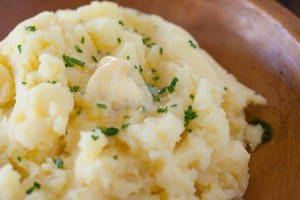
Warm Asian Roasted Potato Salad


More potato recipes
Herbed New Potatoes – Food & Wine
Garlic and Cumin New Potatoes – Betty Crocker
Butter Steamed New Potatoes – Deep Dish South
Crash Hot Potatoes – The Pioneer Woman



